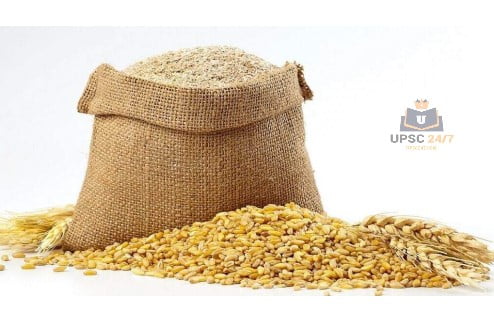MACS 6478 wheat variety | UPSC – Why in News ?
- The wheat variety called MACS 6478 has doubled the crop yield for farmers in Karanjkhop, a village in Maharashtra.
Key Points
- Developed By Scientists from Agharkar Research Institute (ARI), Pune- an autonomous institute of the Department of Science and Technology (DST).
- Matures in 110 days and is resistant to most races of leaf and stem rust.
- This is against the normal maturing attained after 140 to 150 days, required for wheat varieties cultivated commonly in northern India.
- This amber colored medium sized grain contains 14% protein, 44.1 ppm (parts per million) zinc and 42.8 ppm iron which is higher than other cultivated varieties.
- Farmers get a yield of 45-60 quintal per hectare with the new variety as against earlier average yield ranging 25-30 quintal per hectare when they cultivated Lok 1, HD 2189 and other old varieties.

About Wheat Crop : MACS 6478 Wheat Variety
- Wheat crop has wide adaptability.
- It can be grown not only in the tropical and sub-tropical zones, but also in the temperate zone and the cold tracts of the far north ,beyond even the 60 degree north altitude .
- Wheat can tolerate severe cold and snow and resume growth with the setting in of warm weather in spring .
- It can be cultivated from sea level to as high as 3300 meters.
- The best wheat are produced in areas favoured with cool, moist weather during the major portion of the growing period followed by dry, warm weather to enable the grain to ripen properly.
- The optimum temperature range for ideal germination of wheat seed is 20-25 C though the seeds can germinate in the temperature range 3.5 to 35 c.
- Rains just after sowing hamper germination and encourage seedling blight.
- Areas with a warm and damp climate are not suited for wheat growing.
- Wheat plant requires about 14-15 c optimum average temperature at the time of ripening .
International Solar Alliance | UPSC | Power, Functions
Soils Required For Wheat Cultivation :
- Wheat is grown in a variety of soils of India.
- Soils with a clay loam or loam texture, good structure and moderate water holding capacity are ideal for wheat cultivation.
- Care should be taken to avoid very porous and excessively drained oils.
- Soil should be neutral in its reaction.
- Heavy soil with good drainage are suitable for wheat cultivation under dry conditions.
- These soils absorb and retain rain water well.
- Heavy soils with poor structure and poor drainage are not suitable as wheat is sensitive to water logging.
- Wheat can be successfully grown on lighter soils provided their water and nutrient holding capacity are improved.








